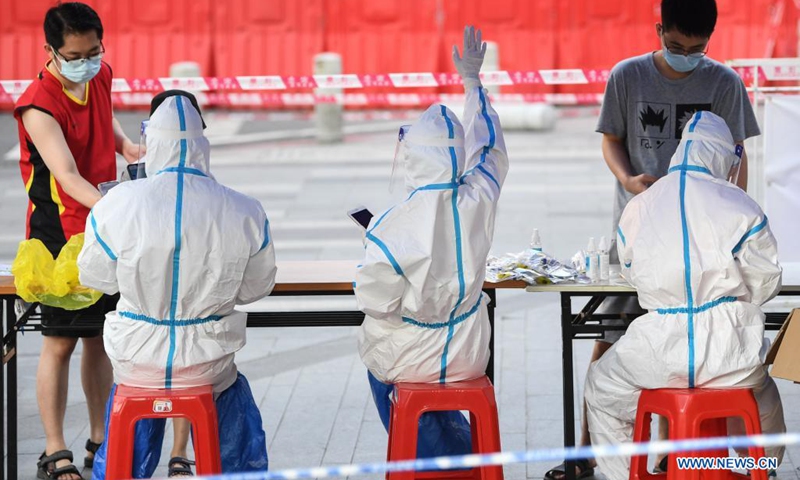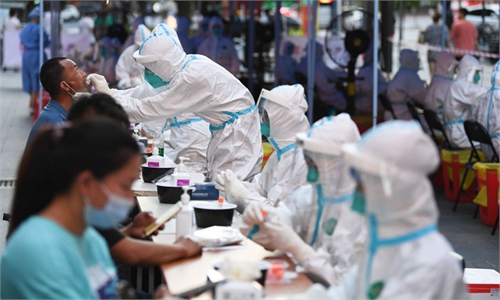Guangzhou tests 16m people in 2 weeks; new tech helps find virus variants in one hour

People have their information registered before COVID-19 nucleic acid testing in Liwan District of Guangzhou, south China's Guangdong Province, June 8, 2021. A new round of mass testing in high-risk areas of Baihedong Street and Zhongnan Street in Guangzhou started on Tuesday.(Photo: Xinhua)
Virus-hit Guangzhou has become the city with the largest nucleic acid testing program in the world, with more than 16 million people tested in about two weeks. New technology can test mutated virus variants in no more than one hour.
As of June 5, Guangzhou has collected more than 16 million samples of nucleic acid tests, surpassing Ho Chi Minh in Vietnam to become the world's largest scale nucleic acid testing city, data from the city's health commission showed.
Mass nucleic acid testing is one of major anti-epidemic measures taken in China. The nucleic acid detection kit developed by Guangdong-based Daan Gene can accurately identify point mutations in the gene sequence, with high detection sensitivity and a nucleic acid analyzer developed by Wanfu Biotechnology that is able to detect and analyze common strains from UK, South Africa and Brazil. Each sample only takes 58 minutes to analyze, Sun Xiang, an official from the science and technology department in the Guangzhou government, said at a press conference on Wednesday.
Sun said Guangzhou is home to more than 5,500 bio-pharmaceutical enterprises and some 1,000 high technology companies in this field. One of the testing institutes in Guangzhou, Guangzhou KingMed Diagnostics Group, is able to test more than 350,000 tubes in one day.
From May 21 to June 8, Guangzhou recorded 115 positive COVID-19 cases. Among them, 106 are confirmed patients.
The results of the detected gene sequencing in all of the infected patients in the latest outbreak in Guangzhou were highly homologous, all from variants detected in India, local health officials had said earlier.
Mutant strains of COVID-19 are undermining prevention and control measures against the virus. In the first stage, we relied mainly on public health prevention and control policies when there was no vaccine, and as we entered the second stage, we chose to use vaccines against the virus, but now we have to readjust prevention and control strategies in the face of mutated variants, Zeng Guang, former Chinese CDC head epidemiologist, told Chinese media yicai.com on Wednesday.
Zeng emphasized the importance of receiving vaccines, as virus variants will continue to mutate if only some countries around the world have an immunity barrier.
Global Times



